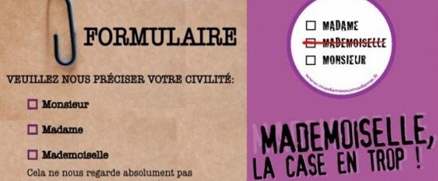Why ‘Mademoiselle’ is an insult to French women
“Is that Madame... or Mademoiselle?” It’s a question often asked in France, whether you’re opening a bank account, voting, or even booking a train ticket. French feminists argue that France needs to get with it, and stop defining women by their marital status.
A group of women’s rights activists have launched a campaign to get ‘Mademoiselle’ as a civility wiped off administrative forms. “Men are called ‘Monsieur’ all their lives,” they argue on the campaign website. “But women are either Mademoiselle or Madame. And that [terminology] is linked solely to their marital status.”

The activists might be absolutely right, but it’s unlikely to get them far. It’s been 40 years since feminists first campaigned for this change, and since then, they’ve invoked more of a sense of outrage than encouragement from the French public. Regarding their latest effort, an online poll hosted by conservative daily Le Figaro saw 75% of voters dead set against the proposal.
But reading the comments below the poll, it’s easy to see that many eager participants had failed to grasp the concept before offering their opinion. “We are not going to go through centuries of beautiful French literature replacing the word Mademoiselle with Madame!” argues one man. Another asks if “young man” will be banned too. “These feminists have psychological problems,” says another, followed by the comment “But Mademoiselle is such a lovely word!”
It’s as though they think uttering the word ‘Mademoiselle’ to a young woman at the corner shop is enough to get you arrested. Alas, non! As many more-informed web users have pointed out on other websites and forums, Mademoiselle as a spoken form is not the crux of the matter. (It’s actually considered a compliment to older French women, and there are plenty of men willing to dole out the term in order to do just that.) What these feminists are arguing is that on an administrative form, ballot slip, tax form or theatre ticket, it should not be obligatory to divulge one's marital status for one gender and not another.
France lagging behind
It comes as no surprise that this remains an issue in France. The country was ranked a poor 48th in global gender equality at the World Economic Forum this year – way behind the likes of its European counterparts which dominate the top ten. French women were some of the last in Europe to get the vote, and they couldn't even open a bank account until 1965. But the Dominique Strauss-Kahn scandal has given France’s feminists, usually dismissed as a bunch of radicals, a rare glimmer of media spotlight. The anti-Mademoiselle crusade is part of a wider awareness campaign attempting to bump France up a few notches in the global scheme of things.
Some argue that there are more important issues to deal with before getting round to details like Miss and Mrs, but minimal changes like these (if there are enough of them), could help to transform the somewhat lackadaisical national mindset. The rest of the West is way ahead when it comes to civility: in Spain, all adult women are registered under Señora, in Germany, it’s Frau, and in the UK and the US, you can choose between Miss, Mrs or the ambiguous Ms, no questions asked. Even in French-speaking Canada, Mademoiselle has long been confined to addressing schoolgirls only.
Back in France, women face raised eyebrows or a knowing look whenever they are compelled to divulge their marital status.
“So is that Madame or Mademoiselle?”
"What a silly question," we might soon be saying – but only if feminists manage to convince the masses that this really is an insult to women.




22 Comments